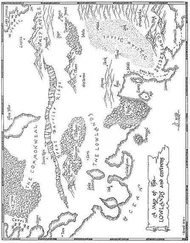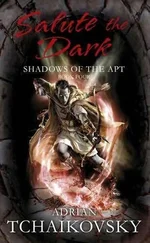The field-chemist sets up her weapon swiftly, preparing the elegantly crafted mixture to discharge into the air ducts, where it will find its way around the ship.
Move on , Portia orders when she is done. They have plenty more such chemical weapons to put in place. There are a large number of giants on the ship, after all.
When they understood at last what Avrana Kern had been trying to communicate with them; when it became obvious that the path their species travelled would bring them inevitably into collision with a civilization of giant creator-gods, the spiders turned to the past for inspiration, seeking out learning buried since the early days of their history. But, for them, history could be remembered like yesterday. They had never suffered the problem with human records: that so much is lost forever as the grinding wheel of the years groans on. Their distant ancestors, in conjunction with the nanovirus, evolved the ability to pass on learning and experience genetically, direct to their offspring, a vital stepping stone in a species with next to no parental care. So it is that knowledge of far distant times is preserved in great detail, initially passed from parents to their brood, and later distilled and available for any spider to incorporate into mind and genes.
Globally, the spiders have assembled a vast library of experience to draw upon, a facility that has contributed to their swift rise from obscurity to orbit.
Hidden in this arachnid Alexandria are remarkable secrets. For example: generations ago, during the great war with the ants, there were giants that walked briefly upon the green world, crew from the self-same ark ship that Portia has now invaded.
One of those giants was captured and held for many long years. The Understandings of the time did not include the belief that it was sentient, and scientists now twitch and skitter in frustration at what might have been learned had their forebears only tried a little harder to communicate.
However, that is not to say that nothing was learned at all from the captive giant. During its lifetime, and especially after its eventual death, the scholars of the time did their best to examine the creature’s biochemistry and metabolism, comparing it to the small mammals they shared their world with. In their library of first-hand knowledge, the spiders uncovered a great deal of how human biochemistry works.
Armed with that knowledge, and a supply of mice and similar animals as test subjects – not ideal but the best they had – the spiders developed their great last-ditch weapon against the invaders. There was much argument between the chosen representatives of cities and great peer groups, and between them all and Avrana Kern as well. Other solutions and possibilities were pared away until the spiders’ nature and the extremity of the situation left only this one. Even now, Portia and the other assault squads are the first to find out that their solution works, at least for now.
The Gilgamesh ’s sensors barely register the concoction as it passes into the ship’s circulation, creeping about the rotating crew section one chamber at a time. There are no overt toxins, no immediately harmful chemicals. Some readouts across the ship begin to record a slight change in the composition of the air, but by then the insidious weapon is already wreaking havoc.
The giant warriors Portia has just defeated have been injected with a concentrated form of the drug. Portia now examines them curiously. She sees their strange, weirdly mobile eyes twitch and jerk, dragged up and about and around by the sight of invisible terrors, as the substance attacks their brains. Everything is going according to plan.
She wants to stay and bind them, but they do not have the time, and she does not know if mere silk could restrain such gigantic monsters. She must hope that the initial incapacity – seen in the mammal test subjects as well – has the intended permanent consequences. It would be inconvenient if the giants somehow recovered.
Portia’s people move on, swift and determined. The substance is harmless to their own physiology, passing over their book-lungs without effect.
Shortly after, they come to a room filled with giants. These are not armed, and they are in several sizes which Portia surmises to be adult and juveniles of various moultings. They are already succumbing to the invisible gas, staggering drunkenly about, collapsing on suddenly fluid legs, or just lying there, staring at sights that exist only in their own minds. There is a strong organic scent in the air, though Portia does realize that many of her victims have soiled themselves.
They check that there is nobody left to fight them, then they move on. There are plenty more giants to conquer.
They could hear Karst shouting and screaming for an appallingly long time, his microphone fixed on an open channel. His suit camera gave them blurred glimpses of hull, stars, other struggling figures. Lain was shouting at him in a cracked voice, urging him to get inside the ship, but Karst was past hearing her, instead fighting furiously with something they could not see. From the fumbling of his gloves, glimpsed briefly in the periphery of the image, it looked as though he was trying to pry his own helmet off.
Then abruptly he cut off, and for a moment they thought he had simply ceased transmitting, but his channel remained open, and now they heard a gurgling sound, a wet choking. The wild movement of the camera had ceased, and the star-field drifted past Karst’s view almost peacefully.
‘Oh, no, no, no…’ Lain got out, before a segmented leg arched up from beyond the camera’s view to plant itself on Karst’s faceplate. They only saw a piece of the thing as it crouched on his shoulder, bunching itself for better purchase. A hairy arachnid with a shimmering exoskeleton, and a suggestion of curved fangs within some kind of mask: man’s oldest fear waiting for him here at the outer reach of human expansion, already equipped for space.
There were reports coming in from all across the ship, by then. Teams of engineers were suiting up – lightweight work suits without any of the armour or systems that had done Karst so little good – and heading into the hostile, contested territory of the cargo holds. Others were trying to repel boarders wherever the scuttling creatures had entered. The problem was that, with the hull sensors torn up in so many places, the Gilgamesh could only make a poor guess at precisely where they had broken in.
For bitter minutes Lain tried to coordinate the various groups, some of them out there on Command orders, others just vigilantes from the Tribe, or woken cargo who had been awaiting a replacement suspension chamber.
Then something changed around them. Holsten and Lain exchanged glances, both knowing instantly that something was wrong, but neither able to quite say what. Something ubiquitous, never consciously noted and always taken for granted, had gone away.
And at the last Lain said, ‘Life-support.’
Holsten felt his chest freeze at the very thought. ‘What?’
‘I think…’ She looked at her screens. ‘Air circulation has ceased. The vents have shut off.’
‘Which means—?’
‘Which means don’t do any more breathing than you have to, because we’re suddenly short on oxygen. What the fuck is…?’
‘Lain?’
The old engineer screwed her face up. ‘Vitas? What’s going on?’
‘I’ve shut the air off, Lain.’ There was a curious tone to the scientist’s voice, somewhere between determined and frightened.
Lain’s eyes were fixed on Holsten, trying to take strength from him. ‘Would you care to explain why?’
‘The spiders have released some sort of chemical or biological weapon. I’m segmenting the ship, cutting off areas that haven’t been infected yet.’
Читать дальше












